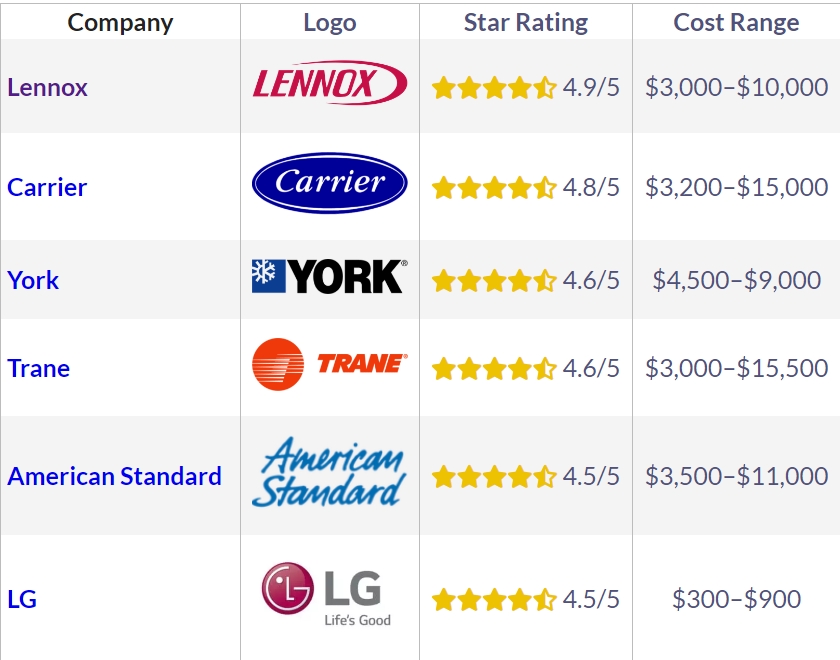Do you not know how to choose a cost-effective and high-performance air conditioner? This article can provide you with some reference. We have selected the six most well-known air conditioning companies in the world for comparison and introduced the answers to common questions about air conditioners. I believe it will be helpful to you.
Top Wall-Mounted Air Conditioner Brands
We recommend these brands based on our research:
Best Overall AC Units: Carrier
Most Energy Efficient: Lennox
Most Protection: Trane
Best Selection: Amana
Best for Extreme Climates: American Standard
The Cheapest: LG
Get quotes from wall-mounted air conditioner brands near you.
Compare Top Air Conditioner Brands
Here is a quick look at how each brand compares:

What to Look for in an Air Conditioner Brand
Homeowners should research air conditioner brands thoroughly before making a decision. Wall-mounted air conditoner are just as important to purchase smartly as central air systems, given that they cost several thousands of dollars and need to provide the cooling power you’re looking for. Below are a few things to consider when deciding on an air conditioner company.
Open Lines of Communication to Customer Service
You want responsive, friendly, helpful, and prompt customer service. Look at how many contact options a company offers on its website. See if both phone and email options are available and if there’s an online request form. Check if there’s a mobile app with a live chat feature. We also recommend reading customer reviews for each brand. See if customers complain of difficulty contacting customer support or if requests take a long time to resolve.
Energy Efficiency
Energy efficiency is one of the biggest factors to look for because it will directly impact your electricity bills. There are two things to look for: SEER rating and ENERGY STAR rating.
An air conditioner’s SEER rating represents the ratio of its cooling output over a typical cooling season divided by the energy it uses in watt-hours. You’ll often see an “up to” condition where the SEER rating is listed. This condition is listed here to indicate that your home’s setup, such as insulation and windows, affects how well the unit can perform, not just the unit’s capabilities. The number means it can perform that well if your home provides optimal efficiency conditions. Any SEER rating above 14 for northern states and 15 for southern states is considered good. The average rating is 16, and anything above 20 is exceptional.
We suggest you look for a unit with ENERGY STAR certification. This means it meets federally mandated guidelines for energy efficiency set by the Environmental Protection Agency and the U.S. Department of Energy. ENERGY STAR requires all certified central air conditioners and heat pumps to have a SEER rating of at least 15.
Units with Low Noise Levels
A noisy unit can be disruptive if you work from home, have young children, or are sensitive to noise. Most brands include a noise score in decibels for each unit on their site. The Purdue University Chemistry Department provides this noise scale to help identify the noise level of each dB rating:
20 dB: Sounds like a whisper or rustling leaves
30 dB: Sounds like a quiet rural area
40 dB: Sounds like an outdoor bird call
50 dB: Sounds like a quiet conversation
60 dB: Sounds like a restaurant or office conversation
70 dB: Sounds like running a vacuum cleaner
80 dB: Sounds like running a garbage disposal or food blender
Smart-Home Features
Smart-home or intelligent cooling features often cost more but can pay off because they provide better temperature control and lower your utility bills. You can control the features through a mobile app, voice commands, or remote control. They allow you to change temperature and humidity levels or set and adjust levels automatically based on your preferred settings. Some even have sleep-mode settings that automatically change your home’s temperature for more comfortable sleeping.
Warranty Coverage
Because you’re making a big investment, you want a solid warranty to back it up if a component malfunctions. We recommend reviewing warranty coverage details on the manufacturer’s website before purchasing. Some AC warranties only cover certain parts, some include labor, and some are for longer time lines than others. We suggest looking for a minimum 10-year warranty that includes parts and workmanship.
How Does a Wall-Mounted Air Conditioner Work?
Wall-mounted air conditioners are sleek, subtle, and use advanced technology. Most designs are rectangular and work by blowing air over coolant coils while expelling warm air outside. They can fit in a framed hole on an exterior wall with a specially designed containment wall sleeve for an airtight seal.
Should You Get a Wall-Mounted Air Conditioner?
Getting a wall-mounted air conditioner can be easier and more cost-effective than installing central air in some cases. It can be helpful if you have a guest house, studio, shed, or outdoor workshop. Most homeowners today don’t prefer the look and noise of wall or window AC, so we suggest avoiding it in your main home if you plan to resell.
Our Recommendation
Our top pick for wall-mounted air conditioner is Carrier. Though the brand is more expensive than others, it’s our all-around choice due to its high energy efficiency, low noise, and positive customer reviews. Lennox is our runner-up. The company’s products are exceptionally energy efficient at a more affordable price.
We recommend carefully reading customer reviews and warranty details before deciding on a unit. We also suggest getting price estimates from at least three brands.
